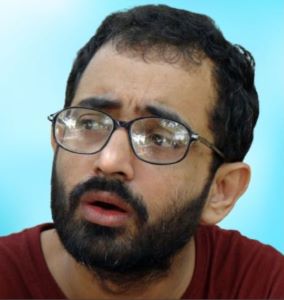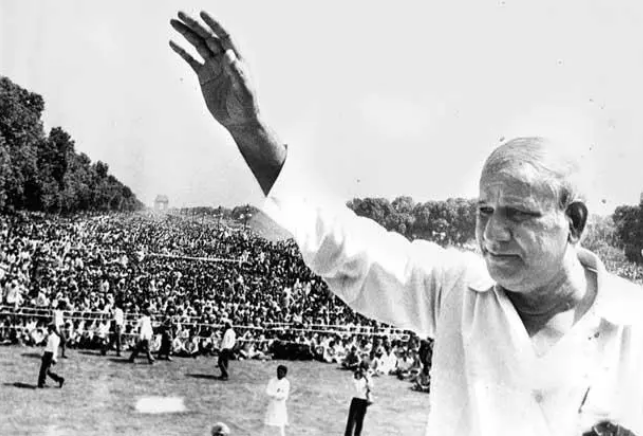
What better way to pay him tribute than remind ourselves about what he stood for – social reform of a caste-ridden Indian society
– Abhay Kumar
Kanshi Ram: 15 March, 1934 – 9 October, 2006
(Samaj Weekly)- On the death anniversary of the BSP founder Manyawar Kanshi Ram what better way to pay him tribute than remind ourselves about what he stood for – social reform of a caste-ridden Indian society.
Much before Kanshi Ram emerged on the larger political scene, Phule, Ambedkar and Periyar had reflected on social reforms. For example, Ambedkar asserted that political reforms without social reforms were meaningless. In his brilliant essay, “Ranade, Gandhi and Jinnah” (1943), Babasaheb persuasively argued that social reforms were more important than political reforms. “Most people do not realize that society can practise tyranny and oppression against an individual in a far greater degree than a Government can,” he explained.

Deeply influenced by Ambedkar’s thoughts, Kanshi Ram, too, underscored this issue. Just as Ambedkar criticised Gandhi and Jinnah for not being concerned about “eradicating social ills”, Kanshi Ram slammed nationalist leaders for ignoring social reforms. He went on to say that while upper castes were the “slaves of the British”, the depressed classes were the “slaves’ slaves”. While the upper-caste-led nationalist struggles were coaxing the British rulers for an early transfer of power into their hands (“swarajya”), the lower-caste leaders were waging a struggle for “self-respect” and against “the age-old bondage, serfdom and humiliations unknown to the rest of the world”. He elaborated this point in his insightful pamphlet (The Chamcha Age, 1982), written on the 50th anniversary of the Poona Pact.
Later in 1997, the year marking the 50th anniversary of Independence, when the brahmanical and capitalist ruling classes were celebrating the “achievements” of post-Independence state in a chauvinistic tone, Kanshi Ram did not forget to show them the cesspool of Indian society. Delivering a speech on “Bahujan Dependency in Free India” on the occasion, he underlined the concern of Ambedkar that political freedom without social emancipation would not bring people relief. “Externally the country had overthrown imperialism,” he said. “But, internally, some classes were tied to other chains: the affluent moneylenders, disparity in [social] conditions, caste system, religious discrimination, etc.” (cited in Anuj Kumar, ed, Bahujan Nayak Kanshi Ram ke Avismarniya Bhashan, 2000, p 23, translation mine)
In his five decades as a social activist and a politician, from the days of the RPI to the BSP, Kanshi Ram was committed to reforming society by removing all that stood in the way of justice – untouchability, inequality, casteism, and obsolete ideas and thoughts. To achieve his goal, he felt the need to unite all those 6,000 castes that are the “victims of the Manuvadi system”. He was perceptive enough to note that caste is like a “two-edge sword”, which could “benefit” Bahujans if they mobilized themselves against the oppressors. He realized that Bahujans could take political power into their hands if they were made conscious of their exploitation and discrimination. Therefore, he initiated social reform movements, preparing the ground for the BSP to capture the “the master key” of “political power”.
As he spoke up against casteist discrimination and mobilized lower castes – which he did throughout his life – his critics lashed out at him for spreading “casteism”. Some liberal and left scholars, too, charged him with deviating from the ideology of Ambedkar. For them, Ambedkar stood for annihilation of caste but Kanshi Ram widened the caste divide. Contrary to the allegations, Kanshi Ram was in favour of building a casteless society, and he disagreed with the notion that talking about the practice of casteist oppression bred casteism. In fact, he argued that recognizing the caste oppression was a prerequisite for its destruction: “We talk of the destruction of ‘caste’, but for this to happen we have to first recognize the existence of ‘caste’. We cannot destroy caste through ignorance about caste or neglecting it.” (Kumar, 2000, p. 68)
Sometime ago, there was a similar debate on the issue of a caste census. Responding to the upper-caste argument that a caste census would encourage casteism, Dalitbahujan thinkers echoed Kanshi Ram’s views: A caste census would reveal the actual social, educational and economic conditions of the lower castes, helping the government and policymakers take appropriate measures to fight casteism.
As the late professor of Dravidian history, caste and popular culture, M.S.S. Pandian rightly argued, the upper-caste liberal and progressive scholars often express their reservations to any talk of caste in public domain, yet they themselves indulge in “transcoding caste and caste relations into something else”. (“One Step outside Modernity”, EPW, 4 May 2002) While the upper castes vehemently oppose caste-based political mobilization and reservations, they are not averse to exploiting the caste networks to serve their own interests. As sociologist Vivek Kumar contends, the majority of public institutions in areas such as business and commerce, media, academia and judiciary still remain monopolized by the upper castes.
Yet, the upper castes, who benefit the most from the caste system, often blame the lower castes for perpetuating it. Kanshi Ram exposed this double standard of the upper castes: “The creation of caste has only benefited a fistful of upper castes, and 85 per cent Bahujans have been facing losses and been the victim of insult and exploitation for thousands of years. If the creation of caste has been benefiting the upper castes, then why do they take the initiative for its annihilation?” (Kumar, 2002, p 68)
Not to speak of the conservative sections of society, the mainstream communists and socialists avoid discussions on caste because they fear that caste mobilization will “divide class solidarity”. Taking a dig at the communists and socialists, he said: “Our intellectuals often think that the solution to all our problems lies in Marxism, socialism, communism. I think, in the country where Manuvad is practised, no other ism can be successful. Because no ism is ready to accept the reality of ‘caste’. Thus it is the duty of intellectuals and it is also my duty to evolve an ism keeping in mind the existence of Manuvad and caste.” (Kumar, 2000, p 78)
At a time when there is an intensified assault of Brahmanism and crony capitalism, it is high time we pledged ourselves to the revolutionary ideas of Kanshi Ram and work towards building the largest possible alliance of democratic forces.









